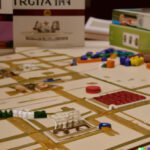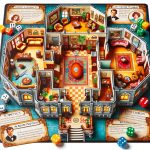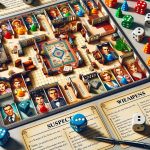Are you looking to master the best clue board game strategy? Look no further. In this article, we will explore the intricacies of the beloved Clue board game and provide you with expert insight on how to develop winning strategies. From understanding the rules and objectives of the game to advanced techniques for bluffing and misdirection, we’ll cover it all.
The Clue board game, also known as Cluedo in some countries, is a classic murder mystery game that requires players to use deduction and logic to solve a crime. With its rich history and enduring popularity, mastering the best clue board game strategy is essential for those looking to outwit their opponents and emerge victorious.
To start our journey into the world of Clue, we will first delve into an introduction to the game itself. Understanding the origins and basic gameplay of Clue will lay the groundwork for developing effective strategies later on. Whether you’re new to the game or a seasoned player looking for an edge, this comprehensive guide has everything you need to elevate your Clue gameplay.
Understanding the Rules and Objective of Clue Board Game
The Clue board game, also known as Cluedo, is a classic murder mystery game that has been captivating players for decades. In this section, we will delve into the rules and the objective of the game to provide a better understanding for both beginners and experienced players.
Rules
The basic rules of Clue are simple: players move around the game board representing the rooms of a mansion, gathering information to deduce which suspect committed the murder, in which room, and with which weapon. Players take turns rolling dice to move from room to room, making suggestions about the suspect, weapon, and location based on the cards they have in their hands.
Other players can refute these suggestions by showing a card if they have one that matches something suggested by another player.
Objective
The main objective of Clue is to be the first player to correctly solve the mystery by making an accusation. This involves being able to gather enough clues from other players’ suggestions and make logical deductions based on these clues. The ultimate goal is to use deductive reasoning and careful analysis of gathered information to narrow down the possible combinations of suspect, weapon, and room until you have enough confidence to make an accusation.
Understanding these fundamental rules and objectives is crucial for developing a winning strategy in the game. With this knowledge in mind, players can then proceed to employ various tactics and strategies that will lead them closer to victory.
Best Strategies for Gathering and Analyzing Clues
When playing the Clue board game, one of the most crucial aspects is gathering and analyzing clues to solve the mystery. Without a solid strategy for this, it becomes challenging to win the game. In this section, we will explore some of the best strategies for gathering and analyzing clues in the Clue board game.
Be Methodical in Gathering Clues
One of the best clue board game strategies for gathering clues is to be methodical in your approach. This means systematically moving from room to room, making suggestions, and keeping track of the information you gather. By being methodical, you ensure that you cover all areas of the game board and have a better chance of uncovering important clues.
Pay Attention to Other Players’ Suggestions
Another effective strategy for gathering and analyzing clues is to pay close attention to the suggestions made by other players. Even if their suggestions do not directly benefit you, they may provide valuable information about the cards they hold or do not hold. This can help narrow down possibilities and lead you closer to solving the mystery.
Use Logic and Deduction
Utilizing logical reasoning and deduction is also essential when gathering and analyzing clues in Clue. By carefully considering each piece of information you gather, eliminating possibilities as you go, and using deductive reasoning, you can narrow down the suspects, weapons, and rooms to finally make an accurate accusation.
By employing these best clue board game strategies for gathering and analyzing clues, players can improve their chances of solving the mystery in Clue and ultimately winning the game.
Tips for Accusations and Deductions
When it comes to making accusations and deductions in the game of Clue, it’s important to be strategic and methodical in your approach. The best clue board game strategy for this aspect of the game involves carefully analyzing the information you have gathered throughout the course of the game and using logical reasoning to make informed decisions.
One effective strategy for making accusations and deductions is to pay close attention to the information that other players reveal during the game. Take note of which cards are shown or passed to others, as this can give you valuable clues about which cards they may hold in their hands. By keeping track of this information, you can narrow down the possibilities and make more accurate deductions.
Another important aspect of making accusations and deductions in Clue is to consider all possible combinations of suspects, weapons, and rooms when trying to solve the mystery. It can be helpful to create a mental or physical checklist of all possible combinations that have been eliminated based on the clues you have gathered. This will help you systematically eliminate possibilities and get closer to solving the mystery.
It’s also crucial to be cautious when making final accusations in the game. Taking risks can sometimes pay off, but it’s essential to have solid evidence before making a final accusation. Use your note-taking abilities and logical reasoning skills to carefully consider all options before making your move. By being patient and thorough in your approach, you can increase your chances of making an accurate accusation and ultimately winning the game.
| Clue Board Game Strategy | Tips for Accusations and Deductions |
|---|---|
| Pay attention to other players’ revealed information | Take note of which cards are shown or passed |
| Create a checklist of possible combinations | Systematically eliminate possibilities |
| Exercise caution when making final accusations | Use note-taking abilities and logical reasoning skills |
Importance of Keeping Track of Suspects, Weapons, and Rooms
When playing the Clue board game, it is crucial to keep track of all the suspects, weapons, and rooms in order to have a better understanding of the game and increase your chances of winning. Here are some tips on how to effectively keep track of these important elements:
1. Create a list of all the suspects, weapons, and rooms: One of the best ways to keep track of the suspects, weapons, and rooms is to create a list for each category. This will help you visually see which ones have been eliminated as possibilities as the game progresses.
2. Use a systematic approach: Develop a systematic approach to keeping track of the clues by using a grid or chart that can help you track which cards have been shown or disproven by other players.
3. Take note of suggestions made by other players: Pay close attention to the suggestions made by other players during the game. By doing so, you can cross out items from your list that have been mentioned as part of their suggestions.
By following these strategies for keeping track of suspects, weapons, and rooms in the Clue board game, you’ll be better equipped to make accurate deductions and accusations based on solid evidence rather than guesswork.
Overall, keeping track of all these elements is an integral part of mastering the best clue board game strategy and increasing your chances of winning.
Utilizing Note-Taking and Logical Reasoning
The best Clue board game strategy involves utilizing note-taking and logical reasoning to gather clues and make deductions. Note-taking is a crucial part of the game, as it allows players to keep track of the information they have gathered and eliminate possibilities. It is important to create a system for note-taking that works for you, whether it involves using shorthand or symbols to represent different elements of the game.
Logical reasoning plays a key role in making deductions based on the clues gathered throughout the game. By analyzing the information obtained from other players’ suggestions and your own observations, you can start to piece together the solution to the mystery. This involves considering all possibilities and eliminating those that are no longer viable based on new information that comes to light during gameplay.
One effective strategy for note-taking and logical reasoning is to pay close attention to which cards are shown or not shown during suggestions made by other players. This can help narrow down which cards your opponents may have in their hands, giving you valuable insights into which suspects, weapons, and rooms are in play.
Additionally, keeping track of your own suggestions and those made by other players can aid in determining which combinations are more likely to be correct as the game progresses.
| Clue Board Game Strategy | Utilizing Note-Taking and Logical Reasoning |
|---|---|
| Note-Taking | Crucial part of the game |
| Logical Reasoning | Analyzing clues gathered throughout |
| Paying close attention | Aid in determining likely correct combinations |
Advanced Techniques for Bluffing and Misdirection
In the game of Clue, advanced techniques for bluffing and misdirection can be the key to victory. Mastering these strategies takes practice and a keen understanding of your opponents’ thought processes. Here are some advanced techniques to help you incorporate bluffing and misdirection into your Clue gameplay:
- False Accusations: Making false accusations can throw off your opponents and lead them down the wrong path. By confidently accusing a suspect, weapon, and room that you know are not the solution, you can plant seeds of doubt in the minds of other players.
- Controlling Information: Be strategic about the information you reveal to other players. By selectively sharing or withholding certain clues during the game, you can manipulate their theories and deductions.
- Conflicting Signals: Sending conflicting signals through your actions and statements can confuse other players. For example, making a show of studying one particular clue while secretly focusing on another can lead your opponents astray.
Using these advanced techniques for bluffing and misdirection requires careful thought and observation. It’s crucial to pay attention to how your opponents react to certain pieces of information or accusations. By staying attuned to their reactions, you can better gauge when to employ these strategies for maximum impact.
Remember that while bluffing and misdirection can be powerful tools in the game of Clue, overusing them may make you appear suspicious to other players. Striking a balance between subtlety and complexity is essential for successfully implementing these advanced techniques as part of your best clue board game strategy.
How to Win the Game and Best Practices for Endgame Strategy
In conclusion, the Clue board game is a classic murder mystery game that requires a combination of strategy, deduction, and a little bit of luck to win. Understanding the rules and objectives of the game is essential for any player looking to develop the best clue board game strategy. The key to winning lies in gathering and analyzing clues effectively, making accurate accusations, and using logical reasoning to narrow down the possibilities.
Keeping track of suspects, weapons, and rooms is crucial for making informed deductions. Utilizing note-taking can help players organize information and identify patterns necessary for solving the mystery. Additionally, advanced techniques such as bluffing and misdirection can be employed to deceive opponents and gain an advantage.
As the game progresses towards its conclusion, having a solid endgame strategy is vital for securing victory. By combining all of these strategies and tactics, players can increase their chances of solving the mystery before their opponents do. Ultimately, mastering these best practices for endgame strategy will give players an edge in their quest to win at Clue.
Frequently Asked Questions
What Is the Best Strategy in Clue?
The best strategy in Clue is to use deductive reasoning to eliminate possibilities and narrow down the potential combinations of suspect, weapon, and location. Keeping track of other players’ suggestions and making strategic accusations is also key.
Is Clue a Game of Luck or Skill?
Clue is a game that combines elements of both luck and skill. While the initial dealing of cards and the movements of other players involve luck, the game ultimately requires skill in deductive reasoning, logical thinking, and strategic decision-making.
What Are the Suggestions in the Game Clue?
In the game Clue, suggestions are made by moving into a room and suggesting a suspect, weapon, and location to find out if any player can disprove it with their cards. This process helps narrow down the possible combinations of cards held by other players and leads to solving the mystery.

I love playing all kinds of games – from classics like Monopoly to modern favourites like Ticket to Ride.
I created this blog as a way to share my love of board games with others, and provide information on the latest releases and news in the industry.





